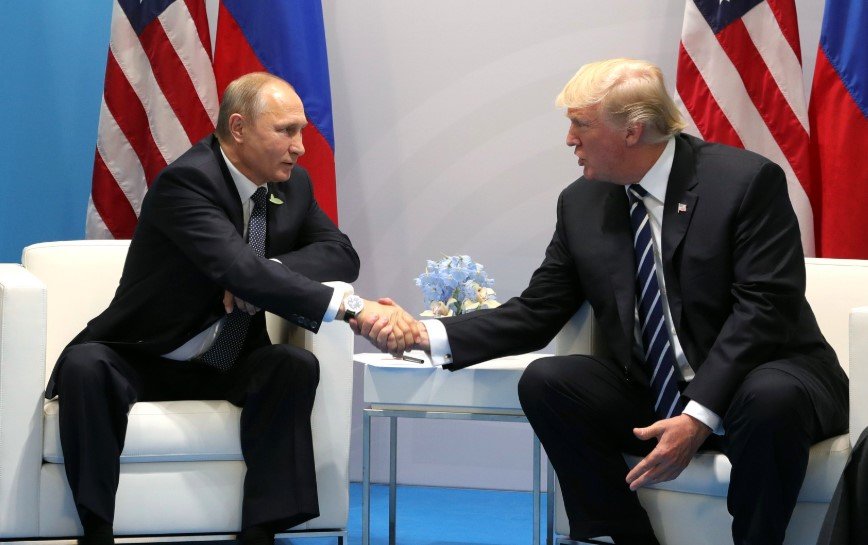Former US President Donald Trump’s sharp words about Vladimir Putin have stirred a fresh wave of reactions, with the Kremlin responding in an unexpectedly calm yet pointed manner. Trump, who recently called Putin “absolutely CRAZY” on social media for the Russian leader’s aggressive military actions in Ukraine, was met with a Kremlin statement attributing his remarks to “emotional overload” during a “very important moment.”
While Trump’s blunt criticism grabbed headlines, the Russian government surprisingly expressed gratitude for his role in ongoing Ukraine peace discussions — a mix of tension and diplomacy playing out on a global stage.
Trump’s Brutal Words and Their Impact
Donald Trump’s Truth Social post didn’t mince words. “I’ve always had a very good relationship with Vladimir Putin,” Trump wrote, “but something has happened to him. He has gone absolutely CRAZY! He is needlessly killing a lot of people, and I’m not just talking about soldiers.”
The former president went on to condemn the ongoing missile and drone strikes on Ukrainian cities, calling the attacks senseless. “Missiles and drones are being shot into Cities in Ukraine, for no reason whatsoever,” he said. Then he doubled down on his prediction, warning that if Putin truly aims to take all of Ukraine, “it will lead to the downfall of Russia.”
Those words are harsh and carry significant weight. Trump’s bluntness caught many off guard, especially since he has previously been seen as more sympathetic to Putin. But this time, his tone was different—angrier, more urgent.
It’s worth asking: What exactly changed? Did Trump’s stance shift, or is this just political rhetoric ahead of another US election cycle? Some observers think it’s a mix of both—Trump reacting to the humanitarian toll and political risks associated with Russia’s war in Ukraine.
Either way, the statement sparked immediate chatter worldwide. Was Trump breaking with his old playbook or just stirring the pot?

Kremlin’s Calm but Careful Response
Kremlin spokesman Dmitry Peskov offered a response that was, frankly, quite measured given the circumstances. “We are really grateful to the Americans and to President Trump personally for their assistance in organising and launching this negotiation process,” Peskov said, referring to ongoing peace talks concerning the Ukraine conflict.
But Peskov didn’t ignore the jab. He described the situation as an “emotional overload,” a phrase that almost sounded like a diplomatic brush-off. “Of course, at the same time, this is a very crucial moment, which is associated, of course, with the emotional overload of everyone absolutely and with emotional reactions,” he added.
The phrase “emotional overload” can be interpreted in many ways — from an attempt to downplay Trump’s remarks to a subtle dig at the former US president’s temperament. It implies a temporary lapse in judgment rather than a serious diplomatic affront. In essence, the Kremlin is signaling, “Hey, we get it. Everyone’s on edge.”
It’s a fascinating example of how the Kremlin handles criticism: acknowledging the comment but not escalating tensions further. It’s a tightrope walk, especially with Ukraine peace talks hanging in the balance.
Peace Talks: The Bigger Picture
What’s striking is the Kremlin’s open appreciation for Trump’s role in the peace negotiation process, despite the harsh words hurled at Putin. It shows how complex international diplomacy can be — where even a blunt insult doesn’t completely derail dialogue.
The ongoing talks are fragile, with global eyes watching closely. Any misstep or aggressive rhetoric can send ripples through diplomatic channels.
Here’s a quick snapshot of the current negotiation landscape:
| Aspect | Status |
|---|---|
| Involved parties | Russia, Ukraine, mediated by international actors |
| Key issues | Ceasefire, territorial integrity, prisoner exchange |
| Recent developments | Fluctuating trust, intermittent ceasefires, stalled talks |
| Role of US (including Trump’s input) | Seen as influential in initiating dialogue, despite political backlashes |
The table above helps put things in perspective: even with the harsh words and emotional flare-ups, the talks continue. It’s like walking a tightrope over a minefield — one wrong move and everything could blow up.
What’s Next for Trump and Putin?
With tensions this high, and emotions running wild, what can we expect going forward?
Trump’s comments are unlikely to soothe nerves in Moscow, but the Kremlin’s reaction suggests they’re not ready to throw fuel on the fire either. It’s a dance of diplomacy and provocation.
Also, Trump’s framing of Putin’s ambitions as “need[ing] all of Ukraine” feeds into broader Western fears about the conflict’s trajectory. Many experts warn that if Russia presses too hard, the costs will spiral beyond control — not just for Ukraine, but for Russia itself.
Is Trump warning, or just throwing shade? Hard to say. But it’s clear the former president wants to be seen as tough on Putin, perhaps recalibrating his image on the global stage.
Meanwhile, Putin remains a polarizing figure — a man whose decisions have caused untold suffering but who also commands massive loyalty at home. How this tension between criticism and support plays out will shape international relations for years.
Emotional Overload or Strategic Play?
The Kremlin’s phrase “emotional overload” is almost poetic in how it captures the current moment — volatile, unpredictable, charged with feelings and high stakes.
It reminds us that even leaders and governments are human in their own way, capable of sharp words, hurt feelings, and strategic patience.
The clash between Trump’s blunt callout and the Kremlin’s calm acceptance reflects a larger truth: global politics often feels like a soap opera — dramatic, messy, and very, very human.
Will the emotional temperature drop? Or are we in for more fireworks? Time will tell.
